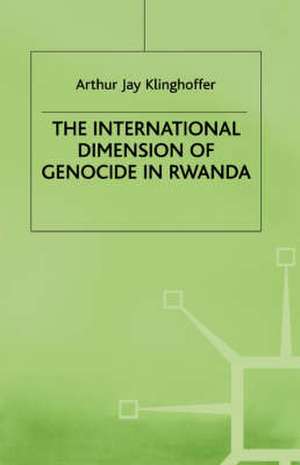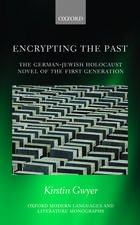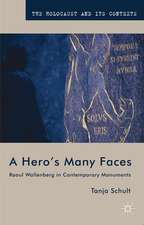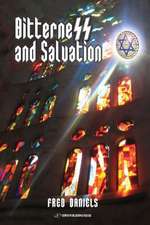The International Dimension of Genocide in Rwanda
Autor A. Klinghofferen Limba Engleză Hardback – 28 sep 1998
Preț: 630.60 lei
Preț vechi: 741.88 lei
-15% Nou
Puncte Express: 946
Preț estimativ în valută:
120.74€ • 125.73$ • 100.18£
120.74€ • 125.73$ • 100.18£
Carte tipărită la comandă
Livrare economică 14-28 februarie
Preluare comenzi: 021 569.72.76
Specificații
ISBN-13: 9780333732038
ISBN-10: 0333732030
Pagini: 219
Ilustrații: IX, 219 p.
Dimensiuni: 140 x 216 x 18 mm
Greutate: 0.45 kg
Ediția:1998
Editura: Palgrave Macmillan UK
Colecția Palgrave Macmillan
Locul publicării:London, United Kingdom
ISBN-10: 0333732030
Pagini: 219
Ilustrații: IX, 219 p.
Dimensiuni: 140 x 216 x 18 mm
Greutate: 0.45 kg
Ediția:1998
Editura: Palgrave Macmillan UK
Colecția Palgrave Macmillan
Locul publicării:London, United Kingdom
Cuprins
Contents Acknowledgements List of Abbreviations PART I Mission Unaccomplished The Bubbling Cauldron PART II Return From Exile Troubled Times Toward the Precipice PART III Turning a Blind Eye Arms Over Plowshares Aftermath PART IV African Limitations French and Belgian Prevarication American Reticence PART V Parameters of Genocide Crime and Punishment PART VI Humanitarian Intervention A Comparative Perspective Sovereignty's Death Throes Index
Recenzii
'An excellent study of one of the hottest topics in world politics - humanitarian intervention. This multidimensional approach to the study of genocide in Rwanda which covers historical, sociopolitical, and international dimensions. Its strength lies in its skilful blend of profundity, and broad coverage of genocide, foreign policy, external intervention, and great power politics.' - Earl Conteh-Morgan, University of South Florida
'A thoroughly researched and documented account of the breakdown of international machinery in the face of state-sponsored lawlessness. The world said `Never again' to genocide after World War II, but this book demonstrates that it has done little to fulfil its vow. Understanding the Rwandan case, as delineated by Klinghoffer, may be the first step to implementing a system of enforcement of the convention against genocide.' - Robert Mortimer
'This is an invaluable and an excellent contribution to the understanding of African Politics, in the context of the tensions and contradictions arising from ethnic conflicts in post-colonial Africa. More than that, it also involves comparative analyses of allegations and incidents of genocide, not only in Africa but also in Europe and other parts of the world. This book is, therefore, also highly recommended to students of international law, international criminal law, and international human rights. It is thoroughly researched, extremely well-written and appropriately documented. The author combines clarity and felicity of style to produce an excellent book which will for long be cited as a treasure trove of facts and information on genocide generally and the Rwandan and African tragedy in particular.' - Professor Kodjo Paaka Kludze, Professor of African and International Law, Rutgers School of Law
'This is essential reading for anyone trying to understand the complexities of the genocide in Rwanda. As well as presenting a comprehensive historical analysis of the concept of genocide, it takes a detailed look at the involvement of all the different actors in Rwanda, and the reaction of the international community to this appalling event.' - Alain Destexhe, President of the International Crisis Group and former Secretary-General, Crisis without Borders
'A thoroughly researched and documented account of the breakdown of international machinery in the face of state-sponsored lawlessness. The world said `Never again' to genocide after World War II, but this book demonstrates that it has done little to fulfil its vow. Understanding the Rwandan case, as delineated by Klinghoffer, may be the first step to implementing a system of enforcement of the convention against genocide.' - Robert Mortimer
'This is an invaluable and an excellent contribution to the understanding of African Politics, in the context of the tensions and contradictions arising from ethnic conflicts in post-colonial Africa. More than that, it also involves comparative analyses of allegations and incidents of genocide, not only in Africa but also in Europe and other parts of the world. This book is, therefore, also highly recommended to students of international law, international criminal law, and international human rights. It is thoroughly researched, extremely well-written and appropriately documented. The author combines clarity and felicity of style to produce an excellent book which will for long be cited as a treasure trove of facts and information on genocide generally and the Rwandan and African tragedy in particular.' - Professor Kodjo Paaka Kludze, Professor of African and International Law, Rutgers School of Law
'This is essential reading for anyone trying to understand the complexities of the genocide in Rwanda. As well as presenting a comprehensive historical analysis of the concept of genocide, it takes a detailed look at the involvement of all the different actors in Rwanda, and the reaction of the international community to this appalling event.' - Alain Destexhe, President of the International Crisis Group and former Secretary-General, Crisis without Borders
Notă biografică
ARTHUR J. KLINGHOFFER is a Professor of Political Science at Rutgers University, USA. He has been the recipient of two Fulbright Fellowships and a Nobel Fellowship, and is the author of ten books including seven on African Politics. Among his publications are The Angolan War, Oiling The Wheels of Apartheid and Soviet Perspectives of African Socialism.










